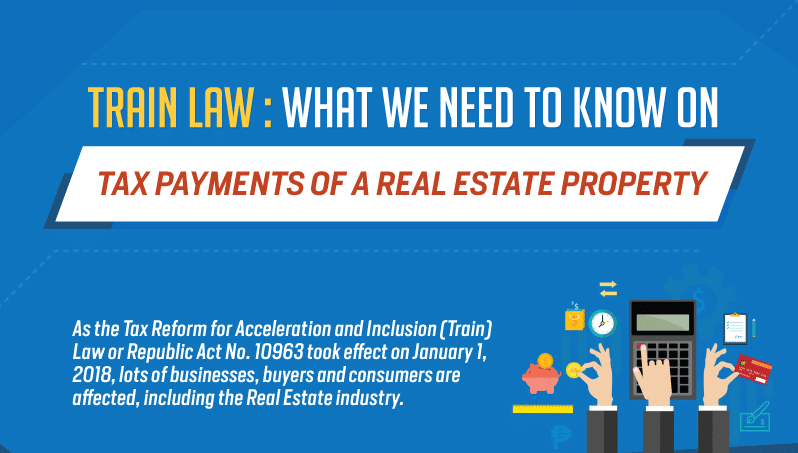
The early part of 2018 marked a monumental event in the Philippine taxation system’s history after the president approved and implemented the first of the many packages that are set to promote socioeconomic transformation in the country: the Tax Reform for Acceleration and Inclusion, also known as the TRAIN Law.
About the TRAIN Law or Republic Act 10963
The TRAIN Law’s first set of goals is focused on generating the needed funding for new and improved infrastructure and related programs and services endorsed by the government under President Rodrigo Duterte.
The new Philippine tax reform presented several amendments as well as an additional list of tax duties that companies, organizations, residents, and non-resident should adhere to. In addition, the redefined tax system was designed to provide easier, “fairer” and more efficient tax policies that will benefit millions of Filipinos and the rest of the country’s rising middle class.
There are several items in the tax reform that have been highlighted in the newly implemented law, and one of them is focused on the tax payments for real estate properties as well as matters concerning estate tax payments.
Estate Taxation and Real Estate duties under the TRAIN Law
Estate Tax: For starters, the rate of the country’s estate tax (tax duties on inherited properties of lawful beneficiaries and heirs from a qualified decedent) was amended from a relative 5% to 20% rate (depending on the value of the property) to a flat rate of 6%.
These changes will affect residents and non-residents but properties that are valued at PHP 10 million below are exempted from estate tax.
The amendment mentioned above is just the tip of the iceberg. Here’s a full list of the sections that have redefined tax payments for estate tax payments and real estate property duties in the Philippines.
1. Tax Deductions
For deductions related to an individual’s (citizens, resident and non-residents, and resident aliens) gross estate, TRAIN law presents several changes on Estate Tax Deductions. For instance, under the new tax system, expenses on the funeral, judicial as well as medical are now removed from related allowable deductions.
Additionally, the new law imposes an increase on the Standard Deduction from the previous PHP 1 million to the new value, PHP 5 million.
On the other hand, non-resident aliens, availing of the standard deductions are only possible for up to the amount of PHP 500,000.
2. Tax Returns
Unlike the old tax law that mandates tax returns exceeding a total gross value of PHP 2 million to be legally certified by a public accountant, CPA certifications are now needed even for estate tax returns that reach a gross value that exceeds PHP 5 million.
In addition, a longer period of one year for filing estate tax returns has been given, compared to the previous 6-month deadline after the death of the decedent.
3. Installment Payment
In line with the promise of a more efficient and less complicated tax collection for estate tax payment, an easier installment process has also been included in the tax reform.
However, payment for liabilities concerning full estate-tax has been limited to two (2) years – a limit that was non-existent in the previous tax law.
4. VAT Exemptions and non-exemptions
The tax reform also offers exemptions from Value Added Tax (VAT) duties for specific estate transactions, especially for socialized housing segments.
However, there are estate transactions that are not covered from the VAT exemptions: the sale of low-cost housing, sales for a residential lot (if valued at PHP 1.919 million) as well as a sale for residential properties that are valued at PHP 3.199 million.
VAT Non-exemptions also cover the lease of residential dwellings with monthly values not exceeding PHP 12,800.
5. Selling and Buying: Tax responsibilities for transactions
The effects of the implementation of the TRAIN Law on the Filipino consumers have been felt since it was implemented in January of 2018. In the real estate industry, transactions that involve the buying and selling of real estate property are expected to adhere to the rules of the newly imposed reform.
From an infographic released by experts from the real estate sector, here are the things you should know about the buyer’s and the seller’s responsibilities.
For Sellers, the property to be sold should be a capital asset, and this includes assets that derive no rental income. Under this category, it’s the seller’s responsibility to cover the Capital Gains Tax of 6%. If classified as an ordinary asset, a VAT will be imposed. More importantly, Creditable Withholding Tax is imposed for ordinary assets habitually sold by the seller.
For Buyers, it’s their responsibility to pay for the Documentary Stamp Tax (1.5%), the Transfer Tax (rates will vary depending on the location of the property), the registration fee, as well as other related fees like the notary fee.
Conclusion
Indeed, the latest tax reform has affected not only Filipinos but also several industries actively operating in the country. That’s why knowing more about the changes, amendments to the law, as well as the additional tax duties that you are obliged to attend to, is very important. As a citizen or even a resident alien, following the new tax law will is not just an obligation but a contribution to support a brighter future for the country as a whole.
Whether you’re a beneficiary of an inherited estate or a buyer/seller of real estate properties, hopefully, this article will help you make informed and educated decisions on transactions and related processes that will affect the outcome of your current and future financial goals.
References:
https://www.bir.gov.ph/index.php/train.html
BusinessTips.ph is an online Business Ezine that provides free and useful articles, guide, news, tips, stories and inspirations on business, finance, entrepreneurship, management and leadership, online and offline marketing, law and taxation, and personal and professional development to Filipinos and all the business owners, entrepreneurs, managers, marketers, leaders, teachers and business students around the world.
Leave a Reply